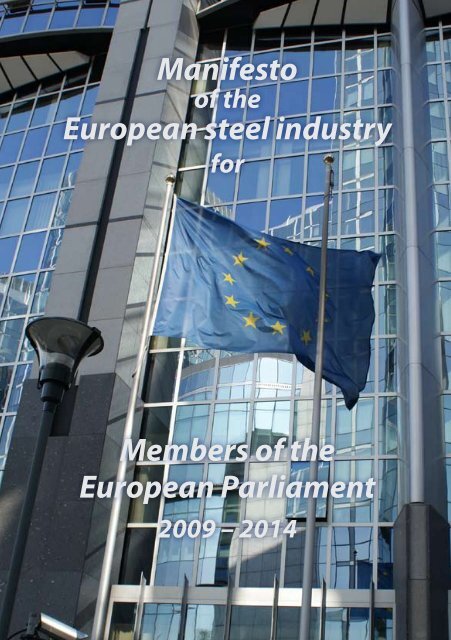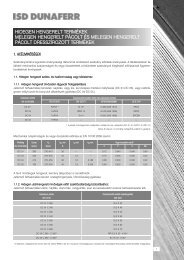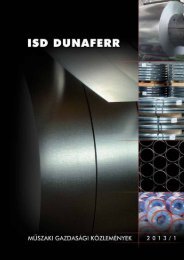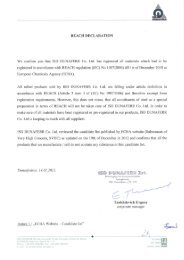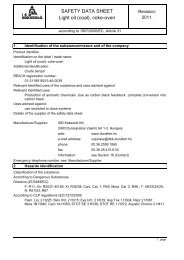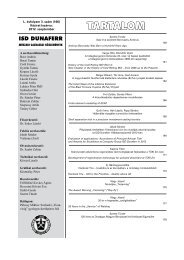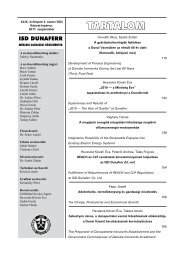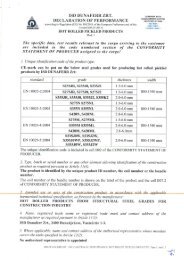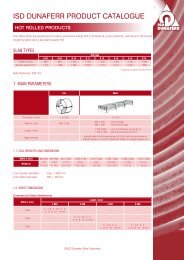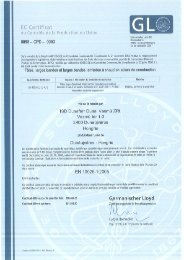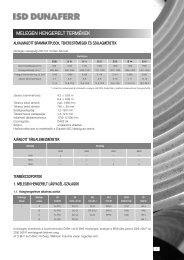Manifesto of the European steel industry for Member of ... - Dunaferr
Manifesto of the European steel industry for Member of ... - Dunaferr
Manifesto of the European steel industry for Member of ... - Dunaferr
You also want an ePaper? Increase the reach of your titles
YUMPU automatically turns print PDFs into web optimized ePapers that Google loves.
<strong>Manifesto</strong><br />
<strong>of</strong> <strong>the</strong><br />
<strong>European</strong> <strong>steel</strong> <strong>industry</strong><br />
<strong>for</strong><br />
<strong>Member</strong>s <strong>of</strong> <strong>the</strong><br />
<strong>European</strong> Parliament<br />
2009 – 2014
2<br />
<strong>Manifesto</strong> <strong>of</strong> <strong>the</strong> <strong>European</strong> <strong>steel</strong> <strong>industry</strong> <strong>for</strong> <strong>Member</strong>s <strong>of</strong> <strong>the</strong> <strong>European</strong> Parliament 2009 – 2014<br />
The 2009 - 2014 <strong>European</strong> Parliament will be a time <strong>of</strong> major political change, with new<br />
roles and responsibilities <strong>for</strong> MEPs. However, it takes place against <strong>the</strong> background <strong>of</strong> <strong>the</strong><br />
biggest economic challenge since <strong>the</strong> founding <strong>of</strong> <strong>the</strong> <strong>European</strong> Coal and Steel Community<br />
(<strong>the</strong> <strong>for</strong>erunner <strong>of</strong> <strong>the</strong> <strong>European</strong> Union) in 1951, which directly led to <strong>the</strong> first <strong>European</strong><br />
parliamentary assembly. It is essential that MEPs take policy decisions that will support<br />
normal financial market conditions and preserve <strong>the</strong> basic industrial jobs that are <strong>the</strong><br />
cornerstones <strong>for</strong> <strong>the</strong> recovery <strong>of</strong> <strong>the</strong> <strong>European</strong> economy.<br />
Over <strong>the</strong> last couple <strong>of</strong> decades <strong>the</strong> <strong>European</strong> Parliament has achieved legislative power in<br />
most <strong>European</strong> policy fields, particularly in those directly or indirectly concerning <strong>European</strong><br />
<strong>industry</strong> and its employees – <strong>for</strong> example <strong>the</strong> internal market, climate change, environment,<br />
health, research, and transport issues. Once <strong>the</strong> Lisbon Treaty has been ratified by all <strong>Member</strong><br />
States, <strong>the</strong> <strong>European</strong> Parliament’s powers will be extended to almost all <strong>industry</strong>-related<br />
issues, and notably to trade.<br />
Today, no sound and sustainable <strong>industry</strong> policy is achieved in <strong>the</strong> <strong>European</strong> Union without<br />
<strong>the</strong> involvement <strong>of</strong> <strong>the</strong> <strong>European</strong> Parliament as equal co-legislator with <strong>the</strong> Council. The<br />
<strong>European</strong> <strong>steel</strong> <strong>industry</strong> welcomes <strong>the</strong>se developments, while recognising that an increase<br />
in Parliament’s sphere <strong>of</strong> influence places more responsibility on <strong>the</strong> <strong>Member</strong>s <strong>of</strong> <strong>the</strong><br />
<strong>European</strong> Parliament to ensure <strong>the</strong> sustainable development <strong>of</strong> all <strong>European</strong> economies<br />
and <strong>the</strong> well-being <strong>of</strong> <strong>European</strong> citizens.<br />
The <strong>European</strong> <strong>steel</strong> <strong>industry</strong> is <strong>the</strong> backbone <strong>of</strong> Europe’s prosperity. It is an indispensable<br />
part <strong>of</strong> <strong>the</strong> <strong>European</strong> supply chain, developing and manufacturing in Europe thousands<br />
<strong>of</strong> different new <strong>steel</strong> solutions. The <strong>steel</strong> <strong>industry</strong> has a long tradition <strong>of</strong> investing in<br />
environmentally sound and energy efficient production. Steel provides <strong>the</strong> foundation <strong>for</strong><br />
innovation, durability and energy savings in applications as varied and vital as automotive,<br />
construction, medical devices, white goods and wind turbines. Steel is 100% recyclable — it<br />
loses none <strong>of</strong> its properties, no matter how many times it is remelted and reused — and<br />
<strong>the</strong>re<strong>for</strong>e contributes significantly to <strong>the</strong> long-term conservation <strong>of</strong> fundamental resources<br />
<strong>for</strong> future generations.<br />
The <strong>European</strong> <strong>steel</strong> <strong>industry</strong> is a world leader in its sector: its annual revenues total more than<br />
200 billion Euros, it directly employs 420 thousand people and it produces more than 200<br />
million tonnes <strong>of</strong> <strong>steel</strong> per year. More than 500 <strong>steel</strong> production sites in 22 EU <strong>Member</strong> States<br />
provide direct and indirect employment and a living <strong>for</strong> millions <strong>of</strong> <strong>European</strong> citizens.<br />
Securing employment and prosperity in Europe through ...
The preservation <strong>of</strong> its basic industries is a vital precondition <strong>for</strong> <strong>the</strong> prosperity and sustainable<br />
development <strong>of</strong> <strong>the</strong> <strong>European</strong> Union. There<strong>for</strong>e, it is essential that <strong>European</strong> legislators<br />
support <strong>the</strong> benefits that <strong>steel</strong> production in Europe brings to its citizens. The <strong>European</strong><br />
Parliament should only adopt legislation that preserves <strong>the</strong> international competitiveness <strong>of</strong><br />
<strong>European</strong> <strong>steel</strong> companies, and it should react firmly against restrictions and distortions by<br />
non-EU countries in international <strong>steel</strong> trade and markets. At its heart, any <strong>European</strong> policy<br />
must secure an international level playing field <strong>for</strong> <strong>the</strong> <strong>European</strong> <strong>steel</strong> <strong>industry</strong>.<br />
As a <strong>Member</strong> <strong>of</strong> <strong>the</strong> <strong>European</strong> Parliament we urge<br />
you to:<br />
;; promote EU climate change policies that ensure a level playing field <strong>for</strong><br />
<strong>European</strong> <strong>steel</strong>makers with competitors from non-EU countries. . . . (p4)<br />
;; seek EU support <strong>for</strong> R&D in new technologies to reduce emissions from<br />
<strong>steel</strong>making and to utilise <strong>steel</strong> more effectively . . . . . . . . . . . (p5)<br />
;; support ‘better regulation’ by reducing <strong>the</strong> administrative and financial<br />
burden <strong>of</strong> <strong>European</strong> environment legislation, whilst improving <strong>the</strong> levels <strong>of</strong><br />
environmental protection . . . . . . . . . . . . . . . . . . . . . . (p6)<br />
;;<br />
secure competitive energy prices in Europe . . . . . . . . . . . . . (p7)<br />
3<br />
<strong>Manifesto</strong> <strong>of</strong> <strong>the</strong> <strong>European</strong> <strong>steel</strong> <strong>industry</strong> <strong>for</strong> <strong>Member</strong>s <strong>of</strong> <strong>the</strong> <strong>European</strong> Parliament 2009 – 2014<br />
;;<br />
take vigorous action to secure open markets and strictly en<strong>for</strong>ce EU trade<br />
laws in order to ensure fair competition from non-EU countries . . . . (p8)<br />
;;<br />
establish an effective EU strategy to secure access to raw materials . . (p9)<br />
... an international level playing field <strong>for</strong> its basic industries
Climate Change<br />
Climate Change – securing a level playing field with non-EU competitors<br />
What is <strong>the</strong> status quo?<br />
4<br />
<strong>Manifesto</strong> <strong>of</strong> <strong>the</strong> <strong>European</strong> <strong>steel</strong> <strong>industry</strong> <strong>for</strong> <strong>Member</strong>s <strong>of</strong> <strong>the</strong> <strong>European</strong> Parliament 2009 – 2014<br />
<strong>European</strong> <strong>steel</strong>makers have reduced CO 2<br />
emissions by more than 50% since <strong>the</strong> 1970s<br />
and by more than 20% between <strong>the</strong> Kyoto reference year, 1990, and 2005. Emissions from<br />
existing technologies <strong>for</strong> integrated (blast furnace) <strong>steel</strong>making have almost reached <strong>the</strong>ir<br />
minimum, and <strong>the</strong>re is little fur<strong>the</strong>r improvement achievable in <strong>the</strong> EU without new process<br />
technologies. Never<strong>the</strong>less, <strong>European</strong> <strong>steel</strong>makers are committed to fur<strong>the</strong>r contribute to<br />
<strong>the</strong> EU’s climate change objectives, including those in <strong>the</strong> EU emissions trading scheme<br />
(ETS).<br />
What <strong>the</strong> <strong>European</strong> Parliament needs to do?<br />
<strong>European</strong> <strong>steel</strong> companies are extremely vulnerable to unilaterally imposed costs, as <strong>the</strong> total<br />
volume <strong>of</strong> imports into and exports out <strong>of</strong> <strong>the</strong> EU27 is 30-40% <strong>of</strong> <strong>European</strong> market demand.<br />
Without a level playing field in climate change policy, non-EU <strong>steel</strong>making competitors<br />
will enjoy an unfair competitive advantage that will distort <strong>the</strong> global market <strong>for</strong> <strong>steel</strong> and<br />
restrict future investment in <strong>the</strong> EU, leading to carbon leakage.<br />
There<strong>for</strong>e, non-EU <strong>steel</strong> producers must commit <strong>the</strong>mselves to equal, verifiable and<br />
en<strong>for</strong>ceable CO 2<br />
reduction targets within <strong>the</strong> framework <strong>of</strong> an international agreement on<br />
climate change that will cover at least 85% <strong>of</strong> world <strong>steel</strong> production. The EU and just nine<br />
countries – Brazil, China, India, Japan, South Korea, Russia, Turkey, Ukraine and <strong>the</strong> USA –<br />
account <strong>for</strong> about 90% <strong>of</strong> world crude <strong>steel</strong> production, which in 2007 totalled 1.35 billion<br />
tonnes. As China alone accounts <strong>for</strong> about 500 million tonnes (35%), its full participation in<br />
any international agreement is indispensable.<br />
Until such an agreement is implemented <strong>the</strong> EU must mitigate ETS-related costs <strong>for</strong> sectors<br />
at risk <strong>of</strong> carbon leakage by continuing to allocate 100% <strong>of</strong> emissions allowances <strong>for</strong> free,<br />
based on challenging but achievable benchmarks. These benchmarks must fully take<br />
account <strong>of</strong> <strong>the</strong> fact that <strong>the</strong> <strong>steel</strong> <strong>industry</strong> sustainably recycles process (waste) gases, which<br />
overall account <strong>for</strong> about 80% <strong>of</strong> CO 2<br />
emissions from primary <strong>steel</strong>making. The EU must also<br />
fully compensate <strong>for</strong> ETS-related increases in electricity costs. Steel plants using electric arc<br />
furnaces, which are fed almost entirely with <strong>steel</strong> scrap, represent 40% <strong>of</strong> <strong>European</strong> <strong>steel</strong><br />
<strong>industry</strong> production. These plants are extremely dependent on electricity costs. Were this<br />
part <strong>of</strong> <strong>the</strong> <strong>steel</strong> <strong>industry</strong> to become uncompetitive because <strong>of</strong> ETS-related increases in<br />
energy costs, <strong>the</strong> effects on those <strong>European</strong> <strong>steel</strong>makers and <strong>the</strong> scrap recycling <strong>industry</strong><br />
would be extremely serious.<br />
Securing employment and prosperity in Europe through ...
R & D<br />
R&D – investing in innovation and new technologies as a top priority<br />
What is <strong>the</strong> status quo?<br />
Research and development (R&D) is <strong>the</strong> basis <strong>for</strong> innovation <strong>of</strong> new, environmentally friendly<br />
technologies, which is essential <strong>for</strong> <strong>the</strong> prosperity <strong>of</strong> Europe. The <strong>European</strong> <strong>steel</strong> <strong>industry</strong> is<br />
constantly involved in this process through <strong>the</strong> development <strong>of</strong> new types <strong>of</strong> <strong>steel</strong> with<br />
specific characteristics, and innovative ways <strong>of</strong> using <strong>steel</strong>, that address <strong>the</strong> needs <strong>of</strong> specific<br />
applications. In this way <strong>the</strong> <strong>industry</strong> has widely contributed, <strong>for</strong> example, to <strong>the</strong> reduction<br />
in CO 2<br />
emissions from vehicles and <strong>the</strong> improved energy efficiency <strong>of</strong> buildings and will<br />
continue to do so. However, to reduce its own CO 2<br />
emissions fur<strong>the</strong>r, <strong>the</strong> EU <strong>steel</strong> <strong>industry</strong><br />
now needs to develop breakthrough technologies. Through participation in <strong>the</strong> <strong>European</strong><br />
Steel Technology Plat<strong>for</strong>m (ESTEP) <strong>the</strong> <strong>industry</strong> is working with <strong>the</strong> <strong>European</strong> Commission<br />
and <strong>Member</strong> States to finance long-term projects aimed at changed process technologies.<br />
The most ambitious being ULCOS (Ultra Low CO 2<br />
Steelmaking), which aims to reduce CO 2<br />
emissions from <strong>steel</strong>making by 50% by 2050. For <strong>the</strong> second phase <strong>of</strong> this project a budget<br />
<strong>of</strong> more than 800 million Euros was identified in March 2009, a large part <strong>of</strong> which will be<br />
<strong>for</strong> a two-stage project comprising a pilot <strong>of</strong> new blast furnace technology with top gas<br />
recycling and <strong>the</strong>n a large-scale demonstration that fur<strong>the</strong>r incorporates carbon capture<br />
and underground storage (CCS). If successful, this technology could be ready <strong>for</strong> wider<br />
industrial application after 2020.<br />
What <strong>the</strong> <strong>European</strong> Parliament needs to do?<br />
The EU should stimulate R&D in innovative, environmentally friendly process technologies<br />
to a much greater extent than it has in <strong>the</strong> past, particularly <strong>the</strong> economically risky and very<br />
expensive pilot and demonstration phases. Financial support and close co-operation between<br />
EU institutions, <strong>Member</strong> States and <strong>the</strong> <strong>industry</strong> are preconditions <strong>for</strong> <strong>the</strong> achievement <strong>of</strong> <strong>the</strong><br />
objectives <strong>of</strong> both <strong>the</strong> EU’s climate change policy and <strong>the</strong> Lisbon strategy. The EU’s research<br />
framework programme and revenues from <strong>the</strong> ETS must <strong>the</strong>re<strong>for</strong>e be used primarily <strong>for</strong> <strong>the</strong><br />
development and demonstration <strong>of</strong> new technologies to reduce emissions at source and<br />
to use <strong>steel</strong> efficiently in downstream products. This will not only help Europe reduce its<br />
own emissions but also provide <strong>for</strong> alternative technologies and reductions in emissions<br />
worlwide. Support <strong>for</strong> R&D is also needed to secure high-quality jobs in <strong>the</strong> <strong>European</strong> <strong>steel</strong><br />
<strong>industry</strong> and <strong>the</strong>reby maintain <strong>the</strong> <strong>European</strong> Union as a region with a strong industrial<br />
backbone in which <strong>the</strong> <strong>steel</strong> <strong>industry</strong> remains a driver <strong>of</strong> technological innovation.<br />
5<br />
<strong>Manifesto</strong> <strong>of</strong> <strong>the</strong> <strong>European</strong> <strong>steel</strong> <strong>industry</strong> <strong>for</strong> <strong>Member</strong>s <strong>of</strong> <strong>the</strong> <strong>European</strong> Parliament 2009 – 2014<br />
... an international level playing field <strong>for</strong> its basic industries
Environment & Be<br />
Environment & Better Regulation – reducing administrative and financial<br />
burdens<br />
6<br />
<strong>Manifesto</strong> <strong>of</strong> <strong>the</strong> <strong>European</strong> <strong>steel</strong> <strong>industry</strong> <strong>for</strong> <strong>Member</strong>s <strong>of</strong> <strong>the</strong> <strong>European</strong> Parliament 2009 – 2014<br />
What is <strong>the</strong> status quo?<br />
<strong>European</strong> environmental legislation is indispensable <strong>for</strong> <strong>the</strong> sustainable development <strong>of</strong> <strong>the</strong><br />
<strong>European</strong> Union and <strong>the</strong> proper functioning <strong>of</strong> <strong>the</strong> internal market. It is <strong>the</strong>re<strong>for</strong>e generally<br />
welcomed by <strong>the</strong> <strong>European</strong> <strong>steel</strong> <strong>industry</strong>, which is committed to constantly improving its<br />
environmental per<strong>for</strong>mance. However, <strong>the</strong>re has been a major increase in <strong>the</strong> volume <strong>of</strong><br />
environmental regulations adopted by <strong>the</strong> <strong>European</strong> institutions every year (almost 100 in<br />
2008 alone!) and many <strong>of</strong> <strong>the</strong>se concern <strong>the</strong> <strong>steel</strong> <strong>industry</strong> directly or indirectly. There has<br />
also been a steady increase in <strong>the</strong> amount <strong>of</strong> reporting and data collection. Toge<strong>the</strong>r <strong>the</strong>se<br />
new regulatory requirements represent a huge bureaucratic and financial burden, creating<br />
duplicate and sometimes contradictory legislation, and jeopardising <strong>the</strong> EU <strong>steel</strong> <strong>industry</strong>’s<br />
competitiveness. In addition, legal uncertainty is created and predictability diminished<br />
by <strong>the</strong> constant shifting <strong>of</strong> objectives and <strong>the</strong> corresponding quasi-continuous overhaul<br />
<strong>of</strong> legislative instruments. The costs associated with <strong>the</strong>se constant changes far outweigh<br />
any benefits. The combined effects <strong>of</strong> <strong>the</strong> directives on Integrated Prevention Pollution and<br />
Control (IPPC, Industrial Emissions), National Emission Ceilings (NEC), Ambient Air Quality<br />
(AAQ) and <strong>the</strong> discussions around a potential SO 2<br />
/NOx emissions trading scheme are<br />
examples.<br />
What <strong>the</strong> <strong>European</strong> Parliament needs to do?<br />
Much greater thought and attention must be given to ensuring that EU legislation, in<br />
particular environmental legislation, is structured and implemented in a way that does not<br />
affect <strong>the</strong> international competitiveness <strong>of</strong> our <strong>industry</strong>. Legislators need to keep legislation<br />
simple, reduce <strong>the</strong> volume <strong>of</strong> new measures, avoid duplicate or contradictory regulation<br />
and excessive reporting requirements, and take account <strong>of</strong> national particularities and <strong>the</strong><br />
subsidiarity principle. All new measures should be preceded by unbiased and pragmatic<br />
cost-efficiency analyses, be realistic in <strong>the</strong> level <strong>of</strong> ambition and technically achievable<br />
and be undertaken with realistic deadlines <strong>for</strong> <strong>the</strong>ir implementation. In particular, no new<br />
legislative proposals should be introduced until a reasonable time period has elapsed after<br />
full implementation in all EU <strong>Member</strong> States.<br />
Securing employment and prosperity in Europe through ...
Energy<br />
Energy – achieving competitive energy prices in Europe<br />
What is <strong>the</strong> status quo?<br />
Internationally competitive energy prices combined with secure energy supplies are vital<br />
<strong>for</strong> <strong>the</strong> success <strong>of</strong> energy-intensive industries like <strong>steel</strong> and must <strong>the</strong>re<strong>for</strong>e be considered as<br />
<strong>the</strong> most essential objective <strong>of</strong> any EU energy policy. So far <strong>the</strong> liberalisation <strong>of</strong> <strong>the</strong> <strong>European</strong><br />
electricity and gas markets has not brought about <strong>the</strong> cost reductions that energyconsuming<br />
industries had hoped <strong>for</strong>. Competition between <strong>European</strong> energy suppliers is<br />
still insufficient to deliver a substantial reduction in energy prices. At <strong>the</strong> same time, <strong>the</strong>re<br />
is a looming gap between supply and demand in many EU countries which will require<br />
massive investment.<br />
What <strong>the</strong> <strong>European</strong> Parliament needs to do?<br />
The 3 rd Energy Package needs to be quickly implemented in order to liberalise <strong>the</strong> <strong>European</strong><br />
energy markets and to encourage <strong>the</strong> expansion <strong>of</strong> trans-<strong>European</strong> energy networks. This<br />
will facilitate competition and build a real Europe-wide common energy market. It is essential<br />
that industrial consumers have access to energy supplies at reasonable costs comparable<br />
to those available to <strong>the</strong>ir competitors. At <strong>the</strong> same time, policy conditions are needed that<br />
will allow negotiation <strong>of</strong> long-term supply contracts between suppliers and large energy<br />
users. A broad energy mix without discrimination between technologies should be <strong>the</strong> basis<br />
<strong>for</strong> a cost-effective and secure energy supply. Renewable energies should be supported,<br />
albeit avoiding excessive incentive costs. Any unilateral EU measures leading to higher<br />
energy prices in Europe, such as those resulting from <strong>the</strong> EU Emissions Trading Scheme<br />
(ETS), energy taxes or renewable fees, must be avoided, capped or compensated <strong>for</strong>, so<br />
that energy-intensive industries are not encouraged to migrate to non-EU countries. This<br />
is particularly important in order to ensure <strong>the</strong> continued recycling <strong>of</strong> <strong>steel</strong> scrap in <strong>the</strong><br />
EU’s energy-intensive electric arc furnace <strong>steel</strong>works, <strong>for</strong> which scrap is <strong>the</strong> almost exclusive<br />
feedstock.<br />
7<br />
<strong>Manifesto</strong> <strong>of</strong> <strong>the</strong> <strong>European</strong> <strong>steel</strong> <strong>industry</strong> <strong>for</strong> <strong>Member</strong>s <strong>of</strong> <strong>the</strong> <strong>European</strong> Parliament 2009 – 2014<br />
... an international level playing field <strong>for</strong> its basic industries
Trade<br />
Trade – securing open markets and en<strong>for</strong>cing EU trade laws to guarantee<br />
fair competition<br />
8<br />
<strong>Manifesto</strong> <strong>of</strong> <strong>the</strong> <strong>European</strong> <strong>steel</strong> <strong>industry</strong> <strong>for</strong> <strong>Member</strong>s <strong>of</strong> <strong>the</strong> <strong>European</strong> Parliament 2009 – 2014<br />
What is <strong>the</strong> status quo?<br />
Given its heavy dependence on imports and exports, <strong>the</strong> <strong>European</strong> <strong>steel</strong> <strong>industry</strong> strongly<br />
supports <strong>the</strong> liberalisation <strong>of</strong> international trade under <strong>the</strong> umbrella <strong>of</strong> <strong>the</strong> WTO. But <strong>the</strong> EU is<br />
<strong>the</strong> most open major market in <strong>the</strong> world, while non-EU <strong>steel</strong> producing countries use many<br />
kinds <strong>of</strong> trade restrictions or distortions to give artificial advantages to <strong>the</strong>ir own industries.<br />
These include a wide range <strong>of</strong> government interventions, including import barriers (such<br />
as tariffs, or restrictive licensing), export incentives (such as VAT rebates or <strong>the</strong> zeroing <strong>of</strong><br />
export taxes) and subsidisation. “Buy national <strong>steel</strong>” campaigns have also become popular.<br />
Meanwhile measures to overcome <strong>the</strong> economic crisis have not, as agreed by <strong>the</strong> G20 in<br />
November 2008, led to a moratorium in <strong>the</strong> establishment <strong>of</strong> new trade barriers - on <strong>the</strong><br />
contrary <strong>the</strong>re has been a dramatic increase in <strong>the</strong>m, most noticeably in <strong>the</strong> <strong>steel</strong> sector.<br />
What <strong>the</strong> <strong>European</strong> Parliament needs to do?<br />
More than ever, <strong>the</strong>re is a particular need now <strong>for</strong> fair international competition and a level<br />
playing field <strong>for</strong> <strong>the</strong> <strong>European</strong> <strong>steel</strong> <strong>industry</strong> as EU <strong>steel</strong> companies individually bring output<br />
into line with reduced demand. The EU must provide a level playing field, taking firm action<br />
against dumped and subsidised products. <strong>European</strong> trade defence laws and practices are<br />
among <strong>the</strong> most liberal in <strong>the</strong> world and must be used to <strong>the</strong>ir fullest extent if <strong>the</strong> EU <strong>steel</strong><br />
<strong>industry</strong> and, as a result, <strong>the</strong> <strong>European</strong> economy as a whole are not to suffer potentially<br />
irreparable damage.<br />
Securing employment and prosperity in Europe through ...
Raw Materials<br />
Raw materials – establishing an effective strategy to secure access<br />
What is <strong>the</strong> status quo?<br />
Like many o<strong>the</strong>r manufacturing industries, <strong>steel</strong>making depends on resources that are scarce<br />
in Europe. In <strong>the</strong> case <strong>of</strong> blast furnace <strong>steel</strong>making this means good quality iron ore and<br />
coking coal. In 2008 <strong>the</strong> <strong>European</strong> <strong>steel</strong> <strong>industry</strong> imported about 150 million tonnes <strong>of</strong> iron<br />
ore and 200 million tonnes <strong>of</strong> coal. Iron ore and coal prices have exploded in recent years<br />
due to increased demand from emerging economies. The supply side has failed to keep pace<br />
with this increased demand, a position which can be expected to return after <strong>the</strong> current<br />
economic crisis abates. Supply has been constricted because <strong>of</strong> <strong>the</strong> market dominance <strong>of</strong><br />
a few actors, in particular Vale, BHP Billiton and Rio Tinto. These three mining giants control<br />
more than 70% <strong>of</strong> <strong>the</strong> world seaborne market in iron ore. Besides, many non-EU countries<br />
impede access to <strong>the</strong>ir raw materials through export restrictions, import subsidies and o<strong>the</strong>r<br />
artificial trade barriers to protect <strong>the</strong>ir domestic industries.<br />
What <strong>the</strong> <strong>European</strong> Parliament needs to do?<br />
The <strong>European</strong> <strong>steel</strong> <strong>industry</strong> welcomes <strong>the</strong> Commission communication on ‘The Raw<br />
Materials Initiative’, adopted in November 2008, as well as initiatives on <strong>the</strong> security <strong>of</strong><br />
<strong>the</strong> supply <strong>of</strong> raw materials <strong>for</strong> <strong>the</strong> energy sector. We urge EU decision makers to take this<br />
as <strong>the</strong> basis <strong>for</strong> <strong>the</strong> development <strong>of</strong> an integrated strategy. Priority must be given to <strong>the</strong><br />
establishment <strong>of</strong> a level playing field <strong>for</strong> access to metallurgical raw materials in <strong>the</strong> EU’s<br />
trade policy as well as in <strong>the</strong> framework <strong>of</strong> <strong>the</strong> EU’s external relations with third countries. In<br />
particular, EU action must include <strong>the</strong> application <strong>of</strong> EU competition rules to guarantee real<br />
competition and oppose fur<strong>the</strong>r concentration in <strong>the</strong> international raw materials markets.<br />
9<br />
<strong>Manifesto</strong> <strong>of</strong> <strong>the</strong> <strong>European</strong> <strong>steel</strong> <strong>industry</strong> <strong>for</strong> <strong>Member</strong>s <strong>of</strong> <strong>the</strong> <strong>European</strong> Parliament 2009 – 2014<br />
... an international level playing field <strong>for</strong> its basic industries
10<br />
<strong>Manifesto</strong> <strong>of</strong> <strong>the</strong> <strong>European</strong> <strong>steel</strong> <strong>industry</strong> <strong>for</strong> <strong>Member</strong>s <strong>of</strong> <strong>the</strong> <strong>European</strong> Parliament 2009 – 2014<br />
<strong>Member</strong>s<br />
EUROFER, <strong>the</strong> <strong>European</strong> Confederation <strong>of</strong> Iron and Steel Industries represents <strong>the</strong> following<br />
<strong>steel</strong> companies, national <strong>steel</strong> federations and associated members:<br />
<strong>Member</strong>s<br />
Acciaieria Arvedi S.p.A<br />
http://www.arvedi.it<br />
Acerinox SA<br />
http://www.acerinox.es<br />
ArcelorMittal Group<br />
http://www.ArcelorMittal.com<br />
BSW - Badische Stahlwerke GmbH<br />
http://www.bsw-kehl.de<br />
Böhler-Uddeholm AG<br />
http://www.bohler-uddeholm.com<br />
Bulgarian Association <strong>of</strong> <strong>the</strong> Metallurgical Industry<br />
http://www.bcm-bg.com<br />
CELSA Group<br />
http://www.gcelsa.com<br />
CMC Zawiercie S.A.<br />
http://www.cmcpoland.com<br />
Corus Group<br />
http://www.corusgroup.com<br />
DanSteel AS<br />
http://www.dan<strong>steel</strong>.dk<br />
Deutsche Edelstahlwerke GmbH<br />
http://www.dew-stahl.com<br />
Dillinger Hüttenwerke AG<br />
http://www.dillinger.de<br />
Duferco S.A.<br />
http://www.duferco.com<br />
Edelstahl-Vereinigung E.V.<br />
http://wwwstahl-online.de/stahl_zentrum/<br />
edelstahl_vereinigung_e_v.htm<br />
ENXE - Hellenic Steelmakers Union<br />
Evraz Vitkovice Steel a.s.<br />
http://www.vitkovice<strong>steel</strong>.com<br />
Fachverband der Bergwerke und Eisen<br />
erzeugenden Industrie<br />
http://www.wk.or.at/bergbau-stahl<br />
Federacciai<br />
http://www.federacciai.it<br />
Federation Française de l’Acier<br />
http://www.ffa.fr<br />
Feralpi Siderurgica S.p.A.<br />
http://www.feralpi.it<br />
Georgsmarienhütte Group<br />
http://www.gmh.de<br />
Georgsmarienhütte Holding GmbH<br />
http://www.gmh.de<br />
Groupement de la Sidérurgie asbl<br />
http://www.<strong>steel</strong>bel.be<br />
Grupo Alfonso Gallardo<br />
http://www.grupoag.es<br />
Gruppo Riva<br />
http://www.rivagroup.com<br />
Halyvourgiki Inc.<br />
http://www.halyvourgiki.com<br />
Hellenic Halyvourgia<br />
http://www.hlv.gr<br />
Hutnictvi Zeleza<br />
http://www.hz.cz<br />
ISD <strong>Dunaferr</strong> Co.Ltd.<br />
http://www.dunaferr.hu<br />
Jernkontoret<br />
http://www.jernkontoret.se<br />
Lech-Stahlwerke GmbH<br />
http://www.lech-stahlwerke.de<br />
Liepajas Metalurgs<br />
http://www.metalurgs.lv<br />
Marienhütte Stahl- und Walzwerk GmbH<br />
http://www.marienhuette.at<br />
Metallinjalostajat<br />
http://www.teknologiateollisuus.fi<br />
Metinvest Trametal SpA<br />
http://www.trametal.it<br />
Securing employment and prosperity in Europe through ...
MVAE - Association <strong>of</strong> <strong>the</strong> Hungarian Steel<br />
Industry<br />
http://www.mvae.hu<br />
Nedstaal BV<br />
http://www.nedstaal.nl<br />
Outokumpu Oyj<br />
http://www.outokumpu.com<br />
Ovako Group<br />
http://www.ovako.com<br />
Polish Steel Association<br />
http://www.hiph.com.pl<br />
Ruukki<br />
http://www.ruukki.com<br />
SIJ Slovenian Steel Group<br />
http://www.sij.si<br />
SSAB Group<br />
http://www.ssab.com<br />
Saarstahl AG<br />
http://www.saarstahl.de<br />
Salzgitter AG<br />
http://www.salzgitter-ag.de<br />
Sidenor<br />
http://www.sidenor.gr<br />
Siderurgia Nacional - Empresa de Produtos<br />
Longos S.A.<br />
Štore Steel<br />
http://www.store-<strong>steel</strong>.si<br />
SPAS - Chambre Syndicale des Producteurs<br />
d’Aciers fins et Spéciaux<br />
http://www.spas.fr<br />
ThyssenKrupp AG<br />
http://www.thyssenkrupp.com<br />
Trinecke Zelezarny AS<br />
http://www.trz.cz<br />
U.S. Steel Kosice<br />
http://www.usske.sk<br />
UK Steel - EEF<br />
http://www.uk<strong>steel</strong>.org.uk<br />
UNESID Spanish Steel Association<br />
http://www.unesid.org<br />
UniRomSider<br />
http://www.web2all.ro/us_romana.htm <br />
Vorskla Steel Denmark A/S<br />
http://www.vorskla.dk<br />
Voestalpine AG<br />
http://www.voestalpine.com<br />
Wirtschaftsvereinigung Stahl<br />
http://www.wvstahl.de<br />
ZDB Group a.s.<br />
http://www.zdb.cz<br />
Associated <strong>Member</strong>s<br />
Colakoglu Metalurji<br />
http://www.colakoglu.com.tr<br />
Diler Demir Celik<br />
http://www.dilerhld.com/diler_demircelik/index.<br />
html<br />
Eregli Iron and Steel Works<br />
http://www.erdemir.com.tr<br />
HABAS<br />
http://www.abas.com.tr<br />
ICDAS<br />
http://www.icdas.com.tr<br />
Iskenderun Demir ve Celik ISDEMIR<br />
http://www.isdemir.com.tr<br />
Izmir Demir Celik IDC<br />
http://www.idc<strong>steel</strong>.com<br />
Kremikovtzi AG<br />
http://www.kremikovtzi.com<br />
Swiss Steel AG<br />
http://www.swiss-<strong>steel</strong>.com<br />
DCUD - Turkish Iron & Steel Producers Association<br />
http://www.dcud.org.tr<br />
... an international level playing field <strong>for</strong> its basic industries<br />
11<br />
<strong>Manifesto</strong> <strong>of</strong> <strong>the</strong> <strong>European</strong> <strong>steel</strong> <strong>industry</strong> <strong>for</strong> <strong>Member</strong>s <strong>of</strong> <strong>the</strong> <strong>European</strong> Parliament 2009 – 2014
<strong>European</strong> Confederation <strong>of</strong> Iron and Steel Industries<br />
ASBL<br />
Avenue Ariane, 5<br />
B-1200 Brussels<br />
Tel: +32 (2) 738 79 20<br />
Fax: +32 (2) 738 79 55<br />
Email: mail@eur<strong>of</strong>er.be<br />
http://www.eur<strong>of</strong>er.org/<br />
Design: ©EUROFER (Gautier Hankenne)<br />
Picture: ©<strong>European</strong> Parliament


